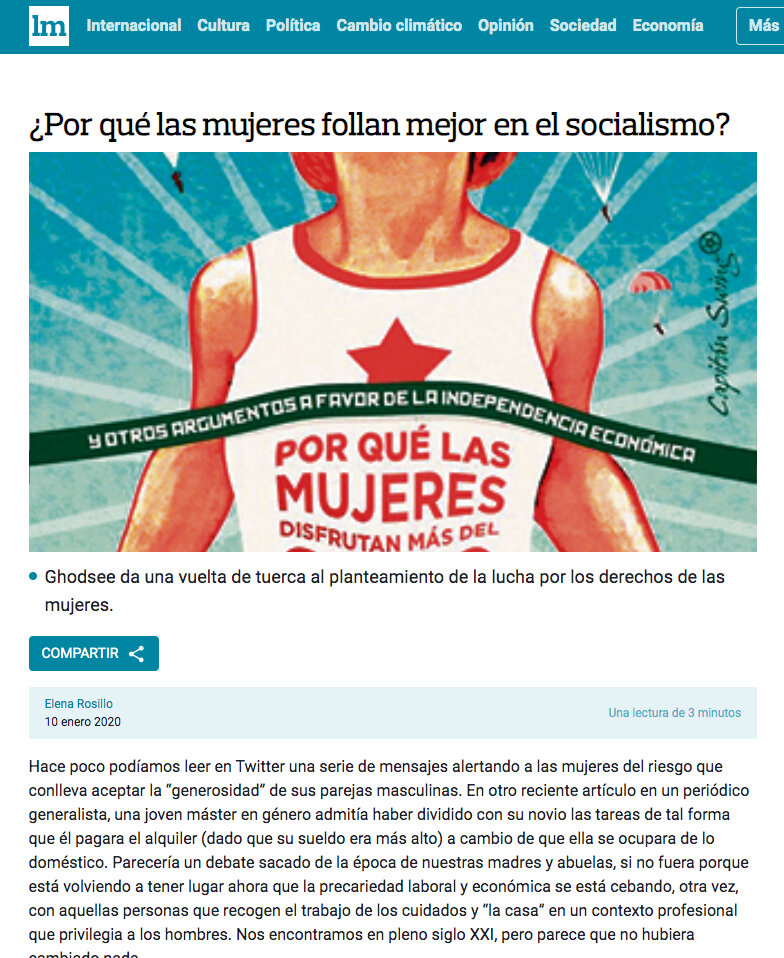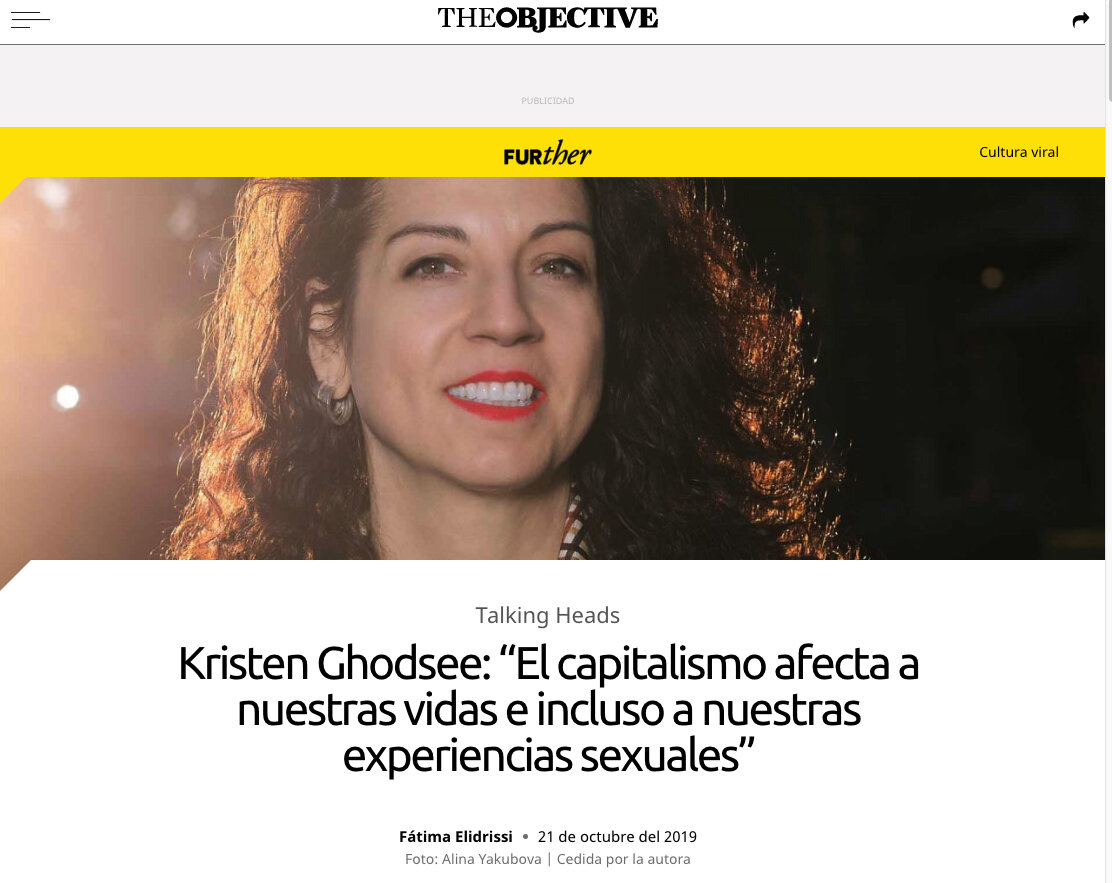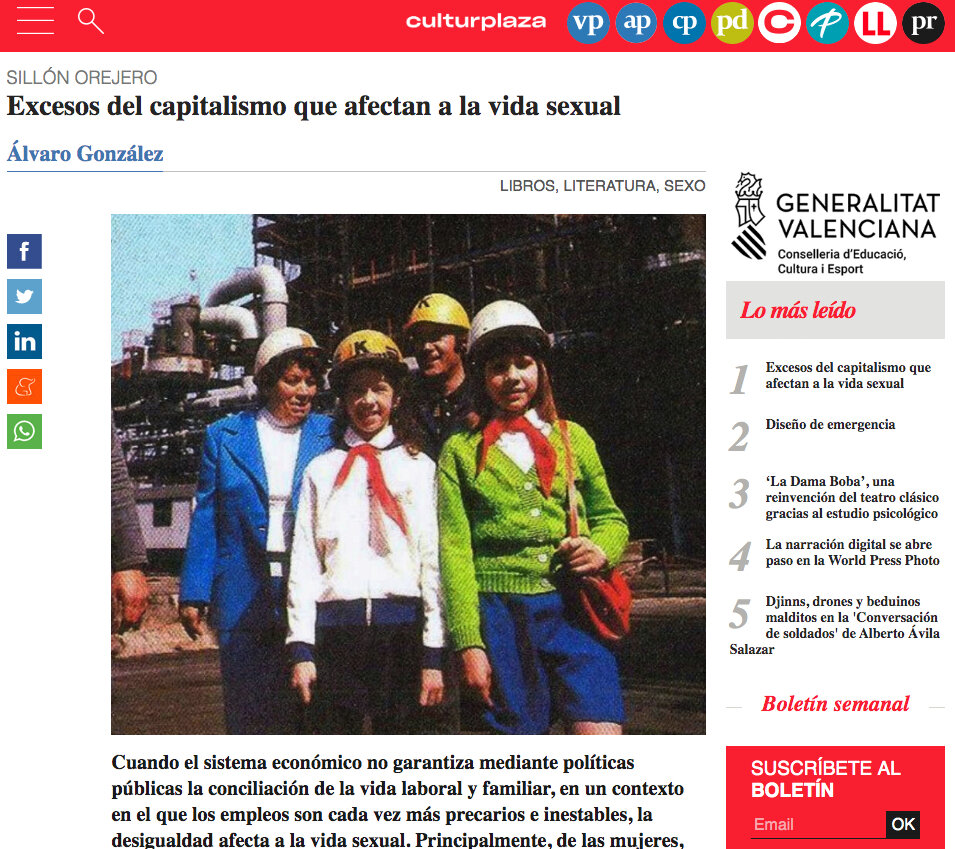I could not be more thrilled that the editors of the American Historical Review decided to feature a review of Second World, Second Sex in their latest issue.
A new review in Germany's national news magazine, Der Spiegel →
New Review of Second World, Second Sex
“Drawing upon sources amassed on three continents, [Second World, Second Sex] also provides a template for navigating transnational history and studying women in marginalized parts of the world. Interrogating why the activities of women in countries with strong states promoting gender equality should be deemed inauthentic vis-à-vis those in democracies that perpetuate patriarchal norms, alongside rendering the Cold War as a battle between not just capitalism and communism but also competing visions of feminism, Second World, Second Sex is essential reading for anyone in any field interested in women’s activism in the twentieth century.”
A new review in El Nacional (Cat) by Marta Roqueta →
“Sexe a la URSS” Marta Roqueta, Barcelona. Dimecres, 22 de gener de 2020 (Catalan)
New review in the January 2020 issue of Kultur Austausch →
“With this book Ghodsee contributes a slice of women’s history on the era before the fall of the Berlin wall. She includes pictures of women on the world stage who are mostly unknown, because the East’s success stories remained untold for too long (to avoid any signs of leniency towards the long-gone unjust regimes). She tells how the Cold War arms race permeated all areas of society, how in 1961 John F. Kennedy laid the legal foundations for the “First Commission on the Status of Women”, which later helped spark the U.S. women’s movement with the help of Eleanor Roosevelt. Part of the reason the USA bid farewell to the ideal of the woman at the stove as the “American Way of Life” was the Russian woman Valentina Tereshkova, who was the first woman in space to orbit the earth 48 times. According to the book, it was feared that socialist states had an advantage in the development of new technologies because they had twice as many bright minds - in Russia women were better educated and the brightest were recruited to work in science.”
Also available in German
Review of Second World, Second Sex →
“[W]e ought to acknowledge the contradictions and complexities of the formerly socialist world, rather than shallowly disregarding it as a monolith of un-freedom. Second World, Second Sex challenges the conventional wisdom of three-wave feminist history by documenting the critical interventions made by these [socialist] women in service of a vision of women’s equality that was always already intersectional, and that refused to separate women’s issues from questions of neo-colonialism, racism, and economic re-distribution. Ghodsee’s book offers a helpful and instructive reminder of socialist feminism’s rich and global history of organization and action, a history that was created and fought for in large part by alliances of women from non-aligned and socialist countries during the Cold War, and whose memory is all too often erased from Western histories of the women’s movement during the “American century.””
По-добър ли е бил сексът при социализма? →
A gorgeous little review in Spain's La Marea (en Español) →
Some nice acknowledgments in Spain and Belgium
Unless you have friends abroad, it is always hard to know exactly how one’s work is being received when it is translated into another language. My German friends and colleagues have kept me apprised of the reception in Germany, but I was really shocked to learn that that one Belgian website (focus.knack.be) chose the Dutch translation as one of their best books of 2019. And in Spain, the national newspaper El Diario chose my book as one of five “cultural milestones” of 2019.
Junge Welt's Best of 2019 →
I know I am not as radical as they would prefer, but I am deeply grateful to Germany’s junge Welt for including my book on their best of 2019 Non-fiction book list.
Sachbuch-Bestenliste für Januar 2020 →
I am very grateful to the 30 jury members of Die Zeit, ZDF, Deutschlandfunk, and others for choosing the German version of my book for their January non-fiction top ten. I am also so thrilled to be be in the company of Naomi Klein as one of the two women authors included on the list.
Die Jury der Sachbuch-Bestenliste
René Aguigah (Deutschlandfunk Kultur), Peter Arens (ZDF), Susanne Billig (Deutschlandfunk Kultur), Ralph Bollmann (F.A.S.), Stefan Brauburger (ZDF), Alexander Cammann (DIE ZEIT), Gregor Dotzauer (Der Tagesspiegel), Heike Faller (DIE ZEIT), Daniel Fiedler (ZDF), Jenny Friedrich-Freksa (Kulturaustausch), Manuel J. Hartung (DIE ZEIT), Thorsten Jantschek (Deutschlandfunk Kultur), Kim Kindermann (Deutschlandfunk Kultur), Inge Kutter (DIE ZEIT), Hannah Lühmann (DIE WELT), Ijoma Mangold (DIE ZEIT), Tania Martini (taz), Susanne Mayer (DIE ZEIT), Christoph Möllers (HU Berlin), Jutta Person (freie Literaturkritikerin), Bettina von Pfeil (ZDF), Jens-Christian Rabe (Süddeutsche Zeitung), Christian Rabhansl (Deutschlandfunk Kultur), Anne Reidt (ZDF), Anna Riek (ZDF), Stephan Schlak (Zeitschrift für Ideengeschichte), Hilal Sezgin (freie Autorin), Catrin Stövesand (Deutschlandfunk), Elisabeth von Thadden (DIE ZEIT), Julia Voss (Leuphana-Uni Lüneburg).
A Thoughtful and Thorough Review in Die Zeit →
A new review in El Diario (en Español) →
“Este ensayo de Kristen Ghodsee (subtitulado y otros argumentos a favor de la independencia económica) es el relato perfecto para acompañar cualquier tipo de lectura más profunda y cavilosa sobre el feminismo, en su amplio contexto temporal como socio-económico.” Read more.
A review in Libros y Literatura (en Español) →
"El socialismo, demuestra Ghodsee, estuvo a la vanguardia en la incorporación de la mujer al mercado laboral y en los beneficios para las familias". Os dejamos la reseña en @librosylit
An interview in Sleek Magazine from Berlin →
Always a pleasure to speak with the journalist, Angela Waters: “Why East Germany was for lovers.”
A wonderful review in Jetzt, the young reader's edition of the Süddeutsche Zeitung →
auf Deutsche: “Haben Frauen im Sozialismus besseren Sex?”
A lovely review from BR24 in Bayern
An unexpectedly kind audio review of the German book.
Entrevista en The Objective →
A new interview from Spain.
Review in the Valencia Plaza →
Another review in Spain (en Español).
Book Review in El País - Spain's largest daily newspaper →
So excited to see this great review.




















